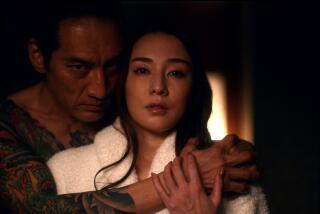MOVIE REVIEWS : ‘Political Game’ Rubs Our Noses in Dirty Tricks
- Share via
If politics, traditionally, has been a dirty game, the Japanese movie “The Political Game” (“Zennin No Joken”) at Little Tokyo Cinema rubs our noses in it. Mass bribery, mudslinging, corruption, advertising, greed and lies rule the day in this scathing portrayal of regional Japanese elections.
Writer-director James Miki puts a Candidesque innocent--a naive college professor seduced into running for mayor by unscrupulous bosses--through all the slime of contemporary politics and lets him come out chastened.
Prof. Kiyokawa (Masahiko Tsugawa) runs for office in the regional city, Hugure, after the previous mayor, his father-in-law, dies of a heart attack in the arms of his mistress. Kiyokawa runs, paradoxically, because he discovers how corrupt Hugure’s politics really are--including the brand practiced by his own supporters, who are largely financed by a company that wants the new regime to rubber-stamp a resort development.
Like many another innocent, Kiyokawa feels he can deal with the devil and emerge unsullied. He is also flattered by all the attention paid him by his conniving courtiers. Even though he would clearly make a weak mayor--his wife married him because he was the opposite of her father--his ego is stroked by the notion of fame and power. But his supporters have no such illusions. They know what it takes to win, and, what the victory will be used for. One by one, Kiyokawa gives up his ideals, cedes ground to the hard-nosed, unsentimental pros around him, especially an icy political mastermind named Arita (played by samurai star Tetsuro Tanba).
Miki has the audacity of a Juzo Itami (“A Taxing Woman”), but he lacks Itami’s skill, his keen eye, psychological cunning and ruthlessly adroit humor. Like Itami, Miki pries open a social mechanism, but he can’t fill this nasty hive with people. Tsugawa’s professor is a soft patsy who goes off the deep end; his seducers tend to be explosive bullies (Issei Ogata’s hothead boss) or sneaky schemers. His wife (Mayumi Ogawa) is a victim; his mother-in-law (Hisano Yamaoka) a manipulative grande dame.
There are hints of “State of the Union” or “The Candidate” here, but little of their control. Miki’s camera style is austere and set-bound, but most of the performances he gets are shallow or florid. Like his characters, he exposes his hand too easily. The villains in this film tend to swagger over their villainy, patiently explaining to Kiyokawa--and us--all the rules of this political cesspool, as if they were conducting a perverted civics lesson.
Only one of them, Tanba’s Arita, emerges as a real character. Tanba plays Arita--an ex-cop and political genius, who knows all the dirty tricks because he has busted many of the tricksters--with the cold panache of Toshiro Mifune’s Yojimbo in a suit. His eyes hidden behind shades, his manner two beats slower and 10 degrees cooler than anyone around him, calmly peeling an orange at his first meeting with Kiyokawa, Arita strips off the pulpy threads as he strips away his client’s illusions.
He is the epitome of the rough, dry-handed pro who laughs at sentiment and plays to win--and, in Tanba, Miki has found the ideal medium to suggest his iconoclastic rage and radical slant. But after Arita devours his orange, and begins to devour the professor too, “The Political Game” (Times-rated: Mature for theme and sexuality) slides too easily into reverse civics lessons. It needs to examine its appalling subject--the political corruption that affects us all--with the same unhurried care with which Arita peels his treat.
More to Read
Only good movies
Get the Indie Focus newsletter, Mark Olsen's weekly guide to the world of cinema.
You may occasionally receive promotional content from the Los Angeles Times.









